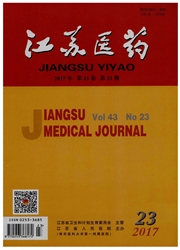

 中文摘要:
中文摘要:
目的:研究磁性纳米Fe304颗粒(MNP-Fe304)对藤黄酸(GA)诱导肝癌HepG2细胞凋亡的作用。方法将HepG2细胞分为GA0.5μmol/L单药组(A组)、GA0.5μmol/L和MNP-Fe3O4 20μg/ml两药联合组(B组)及空白对照组(C组)。采用MTT法检测HepG2细胞增殖的抑制率,流式细胞术检测细胞的凋亡率,Western blot法检测B细胞淋巴瘤/白血病2(Beb2)及半胱天冬氨酸蛋白酶3(Caspase-3)蛋白的表达。结果GA对HepG2细胞生长的抑制作用呈剂量依赖性。与C组相比,A、B组HepG2细胞凋亡率、Caspase-3蛋白表达增加,Bcl-2蛋白表达减少(P〈0.05),且B组各指标变化更为显著(Pd0.05)。结论MNP-Fe。04能增强GA对肝癌HepG2细胞的凋亡诱导作用;其机制可能与Bc1-2表达下调及Caspase-3表达上调有关。
 英文摘要:
英文摘要:
Objective To investigate the effects of magnetic nanoparticle Fe3O4 (MNP-Fe3O4) on apoptosis of hepatocellular carcinoma HepG2 cells induced by gambogic acid (GA). Methods HepG2 cells were divided into three groups of A (treated with GA 0. 5 μmol/L), B (treated with GA 0. 5 μmol/L plus MNP-Fe3O4 20μg/rnl) and C(blank controls). The inhibitory rate of cell proliferation and the cell apoptosis were analyzed by MTT assay and flow cytometry, respectively. The protein expressions of B cell lymphoma/leukemia-2(Bcl-2) and cystein asparate proteinase-3 (Caspase-3) were detected by Western blot. Results GA had an inhibitory effect on proliferation of HepG2 cells in a dose-dependent manner. Compared with group C, the apoptosis of HepG2 cells and the protein expression of Caspase-3 were increased, while the protein expression of Bcl-2 was decreased in groups of A and B(P〈0. 05), the changes of which were more significant in group B(P〉0. 05). Conclusion MNP-Fe304 can promote GA-induced apoptosis of HepG2 cells, which may be related to down- regulating the expression of Bcl-2 and up-regulating the expression of Caspase-3.
 同期刊论文项目
同期刊论文项目
 同项目期刊论文
同项目期刊论文
 Crizotinib as a personalized alternative for targeted anaplastic lymphoma kinase rearrangement in pr
Crizotinib as a personalized alternative for targeted anaplastic lymphoma kinase rearrangement in pr Brentuximab vedotin for treatment of relapsed or refractory malignant lymphoma: results of a systema
Brentuximab vedotin for treatment of relapsed or refractory malignant lymphoma: results of a systema Effects of magnetic nanoparticles of Fe3O4 combinated with gambogic acid on apoptosis of SMMC-7721 c
Effects of magnetic nanoparticles of Fe3O4 combinated with gambogic acid on apoptosis of SMMC-7721 c Targeted multidrug-resistance reversal in tumor based on PEG-PLL-PLGA polymer nano drug delivery sys
Targeted multidrug-resistance reversal in tumor based on PEG-PLL-PLGA polymer nano drug delivery sys Prophylaxis and treatment of acute lymphoblastic leukemia relapse after allogeneic hematopoietic ste
Prophylaxis and treatment of acute lymphoblastic leukemia relapse after allogeneic hematopoietic ste The functional role of microRNA in acute lymphoblastic leukemia: relevance for diagnosis, differenti
The functional role of microRNA in acute lymphoblastic leukemia: relevance for diagnosis, differenti Study on the release of fenofibrate nanosuspension in vitro and its correlation with in situ intesti
Study on the release of fenofibrate nanosuspension in vitro and its correlation with in situ intesti Handy, rapid and multiplex detection of tumor markers basedon encoded silica–hydrogel hybrid beads a
Handy, rapid and multiplex detection of tumor markers basedon encoded silica–hydrogel hybrid beads a Association of polymorphisms of cytosine arabinoside-metabolizing enzyme gene with therapeutic effic
Association of polymorphisms of cytosine arabinoside-metabolizing enzyme gene with therapeutic effic Biocompatibility assessment of polyethylene glycol-poly L-lysine-poly lactic-co-glycolic acid(PEG-PL
Biocompatibility assessment of polyethylene glycol-poly L-lysine-poly lactic-co-glycolic acid(PEG-PL Involvement of c-Jun N-terminal kinase in reversal of multidrug resistance of human leukemia cells i
Involvement of c-Jun N-terminal kinase in reversal of multidrug resistance of human leukemia cells i PLGA-PLL-PEG-Tf-based targeted nanoparticles drug delivery system enhance antitumor efficacy via int
PLGA-PLL-PEG-Tf-based targeted nanoparticles drug delivery system enhance antitumor efficacy via int Biocompatibility Assessment of Polyethylene Glycol-Poly L-Lysine-Poly Lactic-Co-Glycolic Acid Nanopa
Biocompatibility Assessment of Polyethylene Glycol-Poly L-Lysine-Poly Lactic-Co-Glycolic Acid Nanopa Systematic review and meta-analysis of prospective studies for ECP treatment in patients with steroi
Systematic review and meta-analysis of prospective studies for ECP treatment in patients with steroi Hepatocellular carcinoma presenting as thoracic spinal canal metastasis with no clinical primary foc
Hepatocellular carcinoma presenting as thoracic spinal canal metastasis with no clinical primary foc Superselective arterial embolization of the superior mesenteric artery for the treatment of gastroin
Superselective arterial embolization of the superior mesenteric artery for the treatment of gastroin Multifunctional magnetic Fe3O4 nanoparticles combined with chemotherapy and hyperthermia to overcome
Multifunctional magnetic Fe3O4 nanoparticles combined with chemotherapy and hyperthermia to overcome Inducing cell cycle arrest and apoptosis by dimercaptosuccinic acid modified Fe3O4 magnetic nanopart
Inducing cell cycle arrest and apoptosis by dimercaptosuccinic acid modified Fe3O4 magnetic nanopart Gambogic acid suppresses hypoxia-induced hypoxia-inducible factor-1/vascular endothelial growth fact
Gambogic acid suppresses hypoxia-induced hypoxia-inducible factor-1/vascular endothelial growth fact Synergetic effect of functional cadmium-tellurium quantum dots conjugated with gambogic acid for Hep
Synergetic effect of functional cadmium-tellurium quantum dots conjugated with gambogic acid for Hep Reversal of multidrug resistance by cisplatin-loaded magnetic Fe3O4 nanoparticles in A549/DDP lung c
Reversal of multidrug resistance by cisplatin-loaded magnetic Fe3O4 nanoparticles in A549/DDP lung c Effect of magnetic nanoparticles of Fe3O4 and wogonin on the reversal of multidrug resistance in K56
Effect of magnetic nanoparticles of Fe3O4 and wogonin on the reversal of multidrug resistance in K56 期刊信息
期刊信息
